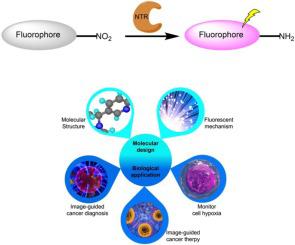Journal of Pharmaceutical and Biomedical Analysis ( IF 3.1 ) Pub Date : 2021-06-09 , DOI: 10.1016/j.jpba.2021.114199 Jian Qiao 1 , Mingying Wang 2 , Menghan Cui 2 , Yuxi Fang 2 , Haonan Li 2 , Chao Zheng 3 , Zhanlin Li 2 , Yongnan Xu 4 , Huiming Hua 2 , Dahong Li 2

|
Nitroreductase is a reductase that catalyzes nitro aromatic compounds to aromatic amines. It effectively reduces nitro to hydroxylamine or amino when in the presence of nicotinamide adenine dinucleotide or nicotinamide adenine dinucleotide phosphate. In terms of tumor, nitroreductase is upregulated in hypoxic tumor cells, and its content is directly related to the degree of hypoxia. Therefore, effective detection of nitroreductase is important not only for the study of cellular hypoxia, but also for the diagnosis and treatment of tumors and related diseases. In this review, we summarized the latest advances in small-molecule fluorescent probes for nitroreductase detection based on different fluorescence mechanisms, with a focus on research conducted between May 2018 and December 2020. The development trends and application prospect in this rapidly developing field were also highlighted.
中文翻译:

用于细胞缺氧相关硝基还原酶荧光检测的小分子探针
硝基还原酶是一种将硝基芳香化合物催化为芳香胺的还原酶。当存在烟酰胺腺嘌呤二核苷酸或烟酰胺腺嘌呤二核苷酸磷酸时,它可以有效地将硝基还原为羟胺或氨基。在肿瘤方面,硝基还原酶在缺氧肿瘤细胞中上调,其含量与缺氧程度直接相关。因此,硝基还原酶的有效检测不仅对细胞缺氧的研究具有重要意义,对肿瘤及相关疾病的诊断和治疗也具有重要意义。在这篇综述中,我们总结了基于不同荧光机制用于硝基还原酶检测的小分子荧光探针的最新进展,重点是 2018 年 5 月至 2020 年 12 月期间进行的研究。


















































 京公网安备 11010802027423号
京公网安备 11010802027423号